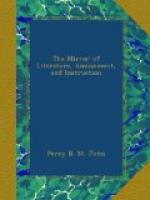The first savages collected in the forests a few nourishing fruits, a few salutary roots, and thus supplied their most immediate wants. The first shepherds observed that the stars moved in a regular course, and made use of them to guide their journeys across the plains of the desert. Such was the origin of the mathematical and physical sciences. Once convinced that it could combat nature by the means which she herself afforded, genius reposed no more, it watched her without relaxation, it made incessantly new conquests over her, all of them distinguished by some improvement in the situation of our race. From that time a succession of conducting minds, faithful depositories of the attainments already made, constantly occupied in connecting them, in vivifying them by means of each other, have conducted us, in less than forty ages, from the first essays of rude observers to the profound calculations of Newton and La Place, to the learned classifications of Linnaeus and Jussieu. This precious inheritance, perpetually increasing, brought from Chaldea into Egypt, from Egypt into Greece, concealed during ages of disaster and of darkness recovered in more fortunate times, unequally spread among the nations of Europe, has everywhere been followed by wealth and power; the nations which have reaped it are become the mistresses of the world; such as have neglected it, are fallen into weakness and obscurity.
Curtis’s Lectures on the Ear.
* * * * *
THE CAUSES OF DISEASE.
Daily observation demonstrates that the human structure, even in its most perfect formation is liable to lesions of organization and derangment of function, producing that state of the system in which its usual actions or perceptions are either interrupted or attended with pain—this state is called disease. Every animal carries within itself the germ of its own destruction, or, in other words, it is formed for a limited existence. Many diseases, therefore arise spontaneously, or without any assignable external cause; but many more are produced by causes, over which we have some control, and perhaps the chief source of the physical ills to which we are liable, is the deviation we make from the simplicity of nature. The injurious influence that domestication has upon the health of the lower animals is very strikingly apparent; and in proportion as their subjugation is more complete, and their manner of life differs more widely from that which is natural to them, so are their diseases more numerous and severe. The diseases of our more valuable domestic animals are sufficiently numerous and important to employ a particular class of men; and the horse alone has professional assistance appropriated to him. Men of education and talent have devoted themselves to the investigation of the diseases of this noble and useful creature. The poor little canary birds confined in their prisons,




